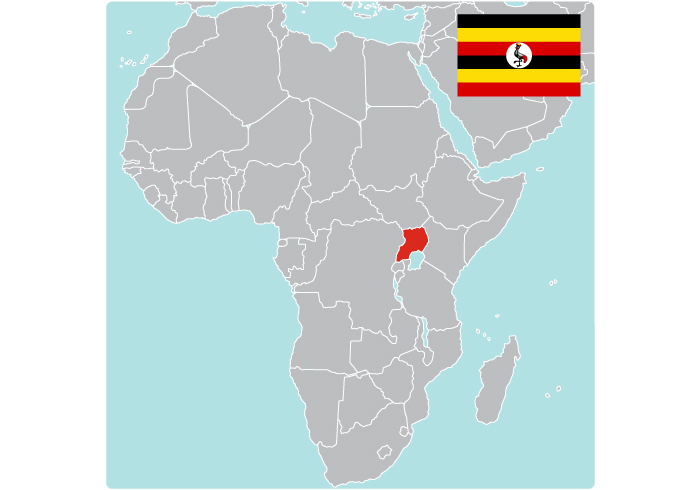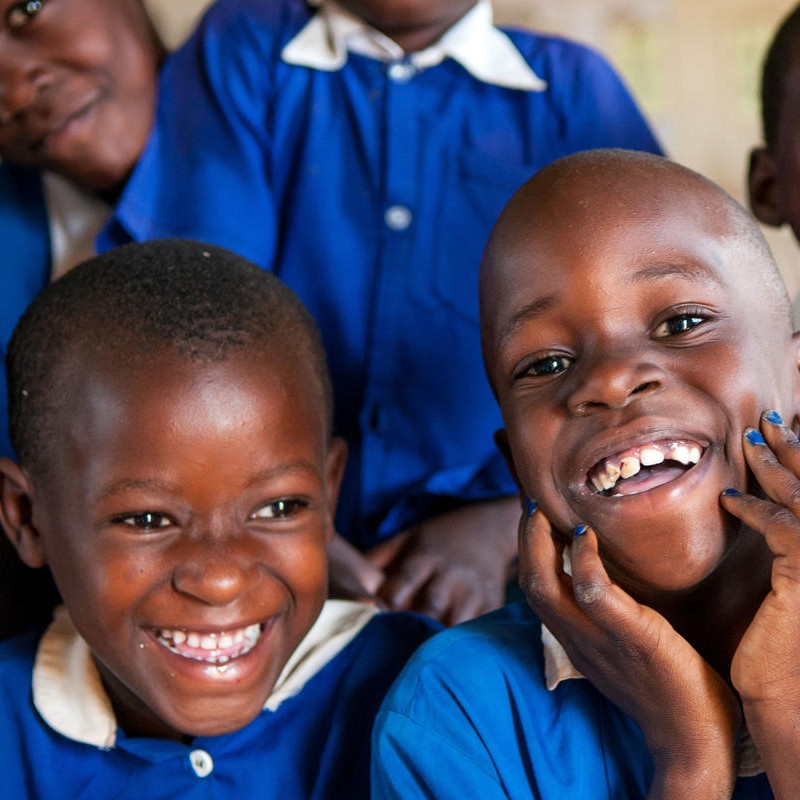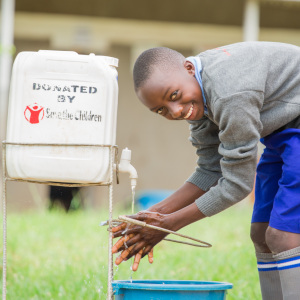Help Children in Uganda
Uganda, officially the Republic of Uganda, is a landlocked country, with a troubled history, set astride the equator in East Africa.
Striving to become a country of relative stability and prosperity, and with a burgeoning youth population, Uganda continues to face numerous challenges. This includes its persistent poverty and struggle to adequately invest in the health, education and economic opportunities of its children.
The country has also had to contend with a brutal 20-year insurgency in the north and an influx of refugees fleeing hunger, instability and violence from neighboring countries. In fact, Uganda is now the largest refugee-hosting nation in Africa, with nearly 1.4 million refugees. There are fears that there will soon be nearly 1 million child refugees in Uganda.
Challenges for Children in Uganda
While there has been some progress for Uganda’s children, enormous gaps remain – with too many still dying from preventable causes, suffering from malnutrition, not getting an education and becoming mothers too soon. In the north, Ugandan children face violence, poverty, scant food and dismal humanitarian conditions. Children in Uganda need your help.
-
1 child in 22 dies before their 5th birthday, 7 times the U.S. rate
-
29% of children suffer from stunting due to malnutrition
-
23% of children are out of school, and 29% of girls (ages 15+) struggle to read and write
-
20% of girls (ages 15-19) are married, and 1 in 8 gives birth
-
21% of people live in poverty

Our Results for Children in Uganda
Thanks to giving people like you, our work in Uganda is changing lives, including the over 552,000 children in Uganda we reached last year with child health care, education and protection.

Children enjoy a laugh at school in rural Uganda, where your support is helping construct classrooms, train teachers, boost children’s literacy and numeracy skills, and more.
-
227,000 children healthy and nourished
-
305,000 children educated and empowered
-
87,000 children protected from harm
-
6,000 children lifted from poverty
-
294,000 children aided in crisis
Our Work for Children in Uganda
Save the Children is one of the largest children’s charity in Uganda, where we’ve worked since 1959. We reach the most vulnerable girls and boys and their families, addressing their health and nutrition needs, their food security and families’ livelihoods. We increase access to education and protect children from harm. We also respond to emergencies.
We’re also working in multiple refugee sites, where many children have walked for days without food, water or rest and are in desperate need of care. Our Emergency Health Unit has helped to rapidly scale-up health services to meet refugees’ needs.
We provide primary health care, reproductive health care, family planning and childhood vaccinations. We also run child-friendly spaces and are accelerating learning programs and classroom construction so children can catch up on their educations.
With Ebola cases on the rise in Uganda, we’re also supporting local efforts to educate people about the disease and its prevention and providing logistical support to district health task forces. We deployed an Ebola expert and an in-country response team.
We’re scaling up our community awareness efforts and education in schools about proper hygiene. And we’re partnering with other agencies on public education campaigns and training village health teams.
Here are some recent examples of our work:
A healthy start in life
- We’re advancing the Helping Babies Survive program, developed by the American Academy of Pediatrics, to improve the quality of comprehensive newborn care in low-resource settings, including training health providers
- Through our Strengthening Partnerships, Results and Innovations in Nutrition Globally (SPRING) project, we’re working with local leaders to improve nutrition for mothers, infants and young children
- We worked with government ministries and district partners to identify the most vulnerable children and families in 35 communities, providing them with the knowledge and skills to effectively access services
- We’re constructing wells and water tanks to ensure communities have access to safe drinking water, reducing the risk of water-related diseases and improving sanitation, health and hygiene
The opportunity to learn
- We’re training teachers on early literacy and math strategies and teaching parents at-home strategies to engage early learners
- We’re ensuring children are benefitting from teachers using positive discipline and gender participation strategies
- We demonstrated significant gains in literacy (by 17 %) and numeracy (by 24%), with conducive learning and improved teacher capacity
- We’re strengthening our education team’s understanding of inclusive education, including how to address discrimination and promote child participation
- We’re providing immunizations, as well as vision and hearing screenings in schools, in addition to setting up medical camps in rural communities
- We’re helping adolescents access quality health care – and training teachers on how and when to refer teens to health clinics
Protection from harm
- Through our Responsible, Engaged and Loving (REAL) Fathers Project in Northern Uganda, we helped fathers improve their parenting practices and reduce violence in the home, with significant declines in intimate partner violence (by 29%) and use of physical punishment (by 18%)
- Through our Parenting without Violence approach, we’re reducing physical and humiliating punishment of children by up to 24%
- We’re ensuring children know their rights, with a focus on ending violence, government investment in child-centered initiatives and sexual and reproductive health
- We’re implementing our Healing and Education through the Arts (HEART) program in preschools and child-friendly spaces in refugee camps and in communities in northern Uganda
Girls Empowerment and Gender Equality
- Our pioneering Gender Roles Equality and Transformations (GREAT) project in Northern Uganda is improving reproductive health and reducing sexual and gender-based violence among adolescents – and the program has been expanded country-wide by the government
- Through our Life Skills for Success approach, we’re helping adolescent girls build life and vocation skills in safe spaces, leading to a 35% increase in the likelihood of their engagement in income-generating activities
Emergency response
- We’re pilot testing our Return to Learning initiative to provide refugee girls and boys with uninterrupted learning opportunities
- We provided access to safe, protective, inclusive and quality early learning environments for children in the Bidibidi refugee camp, as well as those from the host community, recording a significant improvement in learning and developmental achievement
- Our Ebola response team is supporting local efforts in communities to educate people about the disease and its prevention, including training health workers, volunteers, teachers, village health teams and laboratory staff on key steps for preventing and responding to cases, plus providing materials to health facilities and installing handwashing facilities in communities to reduce the risk of contamination
How to Help Children in Uganda
You can create change that lasts a lifetime for children in Uganda – in so many ways.
Donate
Support Save the Children’s mission. Donate to help children in Uganda and around the world grow up healthy, educated and safe.
Join Team Tomorrow
Join Team Tomorrow and your monthly donation will go toward addressing the needs of children affected by today’s most urgent issues.
Browse the Gift Catalog
Give a meaningful gift that will help transform children’s lives and futures in Uganda and beyond. There’s something for everyone!
Sources: Facts and statistics have been sourced from Save the Children’s monitoring and evaluation experts, as well as our thought leadership publications, including our Global Childhood Report 2020 and Stop the War on Children 2020 report. Other sources include CIA World Factbook and BBC Country Profiles.
Photo: Andre Pacutho / Save the Children.
Thank you for signing up! Now, you’ll be among the first to know how Save the Children is responding to the most urgent needs of children, every day and in times of crisis—and how your support can make a difference. You may opt-out at any time by clicking "unsubscribe" at the bottom of any email.
By providing my mobile phone number, I agree to receive recurring text messages from Save the Children (48188) and phone calls with opportunities to donate and ways to engage in our mission to support children around the world. Text STOP to opt-out, HELP for info. Message & data rates may apply. View our Privacy Policy at savethechildren.org/privacy.



